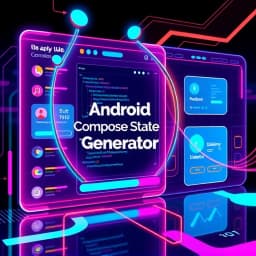
Android Compose State Generator
Find this useful? Bookmark ( CTRL/CMD + D ) for quick access!
Try an example:
Dynamic UI State Management
Form Validation States
Navigation State Handling
Real-time Data Updates
User Interaction Feedback
Theme Switching States
Explore Similar Tools
Recent Generations
the amount paid directly to you. Yes it is possible in future cases to request direct payment to the provider, Rephrase and give me polished email.
we have processed the claim as per the attachments in the claim submission we have processedthe invoice for Saul Holding. We dont have invoice for the Salofalk.
this additional information is very important. this adiitional information was requested by our clinical team. Without clinical review claim not be paid so please share the below additional information
Android Compose State Generator
Android Compose State Generator is a powerful AI-powered tool designed to simplify the development process for Android applications using Jetpack Compose. This innovative solution combines state management with automated code generation to deliver efficient and maintainable UI components, enhancing the overall development experience.
Key Capabilities
- Automated State Management: Generate state classes effortlessly, reducing boilerplate code and ensuring a cleaner architecture.
- Real-time Code Generation: Instantly create composable functions based on user-defined parameters, speeding up the development process.
- Customizable Templates: Tailor the generated code to fit specific project requirements, allowing for flexibility and adaptability in various applications.
- Integration with IDEs: Seamlessly integrates with popular development environments, providing a smooth workflow for Android developers.
Who It's For
Designed for Android developers and teams, Android Compose State Generator excels in creating dynamic user interfaces with minimal effort. Whether you're building a new app from scratch or enhancing an existing project, this tool streamlines your workflow and boosts productivity.
Why Choose Android Compose State Generator
What sets Android Compose State Generator apart is its ability to automate tedious coding tasks while maintaining high standards of code quality, making it the ideal solution for developers looking to optimize their app development process.
Ready to transform your Android development experience? Start using Android Compose State Generator today and unlock the potential of efficient UI design!
Enhance Your Work with Android Compose State Generator
Leverage the power of AI to streamline your tasks with our Android Compose State Generator tool.
Declarative UI State Management
Effortlessly manage UI states in your Android applications using a declarative approach, simplifying the development process.
Seamless Integration
Easily integrate with existing Jetpack Compose projects, enhancing your app's functionality without disrupting your workflow.
Code Generation
Automatically generate boilerplate code for state management, allowing developers to focus on building features rather than repetitive tasks.
How Android Compose State Generator Works
Discover the simple process of using Android Compose State Generator to improve your workflow:
Define State Requirements
Specify the state requirements for your Android application, including data types and structures.
Generate State Code
The tool generates the necessary Kotlin code for managing state in your Compose UI.
Customize Generated Code
Review and customize the generated code to fit your specific application needs.
Integrate and Test
Integrate the generated state management code into your project and run tests to ensure functionality.
Use Cases of
Android Compose State Generator
Explore the various applications of Android Compose State Generator in different scenarios:
Dynamic UI State Management
Efficiently manage and update UI states in Android applications using Compose, allowing for responsive and interactive user experiences.
Simplified State Handling
Generate boilerplate code for state management in Jetpack Compose, reducing development time and minimizing errors in state handling.
Real-time Data Updates
Implement real-time data updates in Compose applications, ensuring that the UI reflects the latest information without manual refreshes.
Testing and Debugging States
Facilitate easier testing and debugging of UI states in Android applications by providing clear and structured state generation for various scenarios.
Who Benefits from Android Compose State Generator?
AI-Powered Efficiency
From individuals to large organizations, see who can leverage Android Compose State Generator for improved productivity:
Android Developers
Streamline UI development with efficient state management for smoother app performance.
Quality Assurance Teams
Ensure robust testing processes by easily managing UI states and scenarios.
UX/UI Designers
Create intuitive user experiences by visualizing and managing app states effectively.
Project Managers
Oversee project timelines and deliverables with clear visibility into development states.
Frequently Asked Questions
What is the Android Compose State Generator?
The Android Compose State Generator is a tool designed to simplify the management of state in Jetpack Compose applications, allowing developers to generate boilerplate code for state management efficiently.
How does the Android Compose State Generator improve development speed?
By automating the creation of state management code, the Android Compose State Generator reduces the time developers spend on boilerplate code, allowing them to focus on building features and improving app functionality.
Is the Android Compose State Generator compatible with existing projects?
Yes, the tool can be integrated into existing Jetpack Compose projects without any issues, helping to enhance state management practices in your current codebase.
What programming languages does the Android Compose State Generator support?
The Android Compose State Generator primarily supports Kotlin, as it is the main language used for developing Android applications with Jetpack Compose.
Are there any prerequisites for using the Android Compose State Generator?
To use the Android Compose State Generator, you should have a basic understanding of Jetpack Compose and Kotlin, as well as an existing Android development environment set up with the necessary dependencies.
































